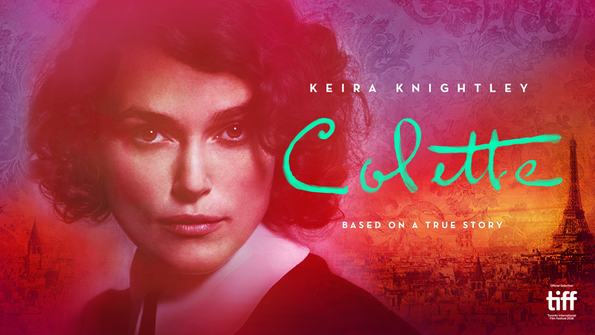Film featuring literary titan does right by her, mostly
Sidonie Gabrielle Colette, better known solely as Colette, is one of the most interesting women from the 20th century. She was a titan of French literature, nominated for a Nobel Prize for literature in 1948, and it still took until 2018 for a movie to be made about her. Something does not seem right about that.
The biographical movie, “Colette,” focuses primarily on Colette’s (portrayed by Keira Knightley) first marriage to writer and critic Henri Gauthier-Villars, or “Willy” (portrayed by Dominic West), and the anguish Colette experiences her marriage.
“Did you ever feeling like you were just playing a part?” Colette asks Sido, her mother (portrayed by Fiona Shaw), not long after they get married.
In summary, she becomes a literary slave of sorts to her husband, who locks her in a room to write “Claudine,” a series of novels he could not dream of writing. He takes credit for her labors, earning a fortune off of Colette’s work.
All the while, both she and Willy see other people during their marriage.
She unapologetically explores the parts of her sexuality that draw her to the American heiress, Georgie Raoul-Duval (Eleanor Tomlinson), and Missy (Denise Gough), a member of the russian nobility who wears trousers and lives a masculine life.
There is never a clear statement whether or not Missy is transgender. Colette only mentions that “there isn’t a word to describe her,” which given the time period is quite possibly true.
This is part of what makes “Colette” interesting; the fact that it illustrates the idea that sexually undefined relationships are not new to Western culture is rare and very valuable. Colette’s relationships are examples of how old the concepts of same-sex relationships and transgenderism are, even if at the time there was not the language to describe such relationships.
Though it seems to be a trend among filmmakers to whip out a pair of gays and call it “art” for a cheap buck and an Oscar, I appreciate the fact that “Colette” assures non-heterosexual couples that they have history too.
In Colette’s words, “The hand that holds the pen writes history,” and at least in 1894, that happened.
In tandem with good ol’ fashion representation, one of the film’s greatest achievements would be the casting of Keira Knightley as the leading lady.
Knightley articulates Colette as a dynamic and exciting woman. Viewers can physically and emotionally see Colette change, her metamorphosis from Sidonie Gabrielle Colette to Colette is exciting and liberating. At the beginning of the movie, she would dutifully follow the orders of her husband, although with some attitude. By the end when he yells at her not to leave, she practically scoffs in his face.
The movie also avoids a typical pitfall of many 19th and 20th century period pieces, which consistently flatten the women they tell stories about. Women are often exclusively three things: pretty, witty and poised. “Colette” does not do that.
Though Colette is all of those things, she is much more. Through Knightley, we see Colette as curious, flawed, passionate, artistic and full of rage when her husband’s poor choices warrant it. A justifiably angry woman is a rare picture in movies. As Colette hammars at a locked door, screaming and swearing at Willy to let her out, the audience is filled with that same rage and excitement.
Alongside Knightley’s performance, what makes the movie intriguing is hardly the movie itself, but the story behind it.
It explains how “Claudine” — thanks to the real Colette — gave women of the time something to be other than a doting housewife. Someone who was adventurous, intelligent and openly sensual while still desirable.
At the same time, the movie questions the idea that women are only ever one thing for their whole lives. The character of Claudine is a reflection of Colette of when she was younger is no longer enough for her. Colette outgrows the character.
Whether or not director Wash Westmoreland did this intentionally, there is a parallel between Colette’s change as she learn about herself and how people change as they learn about themselves. It is a way of telling audiences that they have their own Claudine to evolve from.
“There will be a time when you must decide,” asks Missy of Colette. “Are you Claudine or are you Colette?”
That said, “Colette” has its flaws.
The movie barely skims the surface of the full life Colette had. It steps over the neglected daughter and sweeps Colette’s seduction of her stepson under the rug. The whole movie captures about 10 years of her 81 year life and does so rather inaccurately in many instances.
Even with the shortened narrative of Colette, it feels as though director Wash Westmoreland was unsure of what kind of movie it would be. An empowering story of a woman breaking free from both sexual and emotional repression? A period piece commenting on pretentious, bourgeois society? Maybe even an exploration of sexuality and gender? Westmoreland never seems to find his footing.
However, what makes “Colette” effective is the way it illustrates how people change over time. There are threads of Colette’s character that is consistent throughout her life, such as her intelligence, wit and care for those close to her. Over time, however, Colette does not accept what does not make her happy, and instead leans into her instincts and true nature.
Something that I think makes a good movie is how well it reflects humanness, and despite its many flaws, “Colette” does that.
(Photo Courtesy of Bleeker Street Media)

















































































